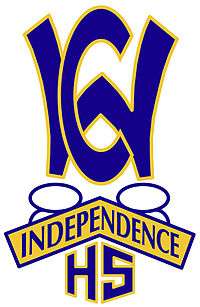William Chrisman High School
| William Chrisman High School | |
|---|---|
 | |
| Address | |
|
1223 North Noland Road Independence, MO 64050-1947 United States | |
| Coordinates | 39°6′12″N 94°24′42″W / 39.10333°N 94.41167°WCoordinates: 39°6′12″N 94°24′42″W / 39.10333°N 94.41167°W |
| Information | |
| Type | Public, grades 9–12 |
| Established | 1888 |
| School district | Independence School District |
| Superintendent | Dale Herl |
| Principal | Mike Becker |
| Enrollment | 1491[1] (September 22, 2013) |
| Color(s) | Blue and gold |
| Mascot | Bears |
| Nickname | Bruins |
| Information | (816)521-5355 |
| Website | William Chrisman Website |
William Chrisman High School is a high school located in Independence, Missouri, United States, as part of the Independence School District. The school was founded in 1888 and was known as Independence High School. The first building was located at the intersection of Pleasant and Truman Road, the current location of the Palmer/Central Office Building. It is from this location that President Harry S. Truman, First Lady Bess Truman, and Truman White House Press Secretary and Pulitzer Prize winner Charles Griffith Ross graduated from in 1901.
In 1917 the Independence School District passed a levy and bond to build a new high school building. Margaret Chrisman Swope offered to sell the district land for the new school at the southeast corner of Union and Maple for $1 in exchange for naming the school after her father, William Chrisman. Chrisman had served as a member of the first school board in 1866 and was also a prominent lawyer and banker in the community. The new building opened in 1918 as William Chrisman High School. The high school moved to its current site in 1956, at the northeast corner of Noland Road and U.S. Route 24 (Independence Avenue), when a major addition was added to Ott Elementary School and the building was converted into the high school. Since that time the building has undergone numerous additions.
Demographics
William Chrisman is home to 1491 students from Independence, Missouri and part of Sugar Creek, Missouri (as of the beginning of the 2013-2014 school year). The student population's racial breakdown is: 72.5% white, 12.6% black, 9.1% Hispanic, 0.7% Asian, and 0.3% Native American.[1]
House system
As of the 2007–2008 school year, all high schools in the Independence School District started a “house system”. The house system is a classification of students into five houses. At the end of the 2009-2010 year, it was announced the school would only have four houses, (former houses 1, 2, 3, and 5). In the fall of 2010 the school adopted bear names for the houses. House One became the Grizzly House. House Two became the Panda House. House Three became the Kodiak House. And House Five became the Polar House. House Four was dissolved at the end of the 2009-2010 school year.
Extracurricular
Sports
William Chrisman is a member of the Suburban Kansas City- White, a division of the Greater Kansas City Suburban Conference League, which realigns/changes every two years. Consisting of high schools: William Chrisman, Oak Park, Raytown, Fort Osage, Liberty North, and Staley[2] William Chrisman also plays Truman, and Van Horn, which are also part of the Independence School District.
Fall
The William Chrisman Bears compete in the following fall sports: Boys: cross country, football, soccer, swimming; Girls: volleyball, cross country, golf, softball, tennis.
Winter
The William Chrisman Bears compete in the following winter sports: Boys: basketball, wrestling; Girls: basketball, swimming.
Fall and winter
The William Chrisman Bears compete in the following art sports: Boys & Girls: dance team.
The dance team, initially created as a drill team, is still traditionally called the Beartrackers. The team is co-ed and performs routines to music mixes of each generation during summer camps, the high school's larger sporting events' break times, class assemblies, parades and end of the season competitions.
Spring
The William Chrisman Bears compete in the following spring sports: Boys: baseball, golf, tennis, track & field; Girls: soccer, track & field.
Yearly events
- Foreign Language Festival - an annual carnival and cabaret show combine to become the biggest earner of additional revenue for the French, German, and Spanish Language Departments
- Independence Winter Classic Forensics Tournament - competitive debate rounds and oratory speech combine to establish the traditional speech and debate tournaments that occur every December, in which Chrisman and Truman High School participate in acting as host schools for the district tournament
Notable alumni
- Forrest "Phog" Allen - KU basketball coach
- Don Buschhorn - former MLB player (Kansas City Athletics)
- Mort Cooper - former MLB player (St. Louis Cardinals, Boston Braves, New York Giants, Chicago Cubs)
- Walker Cooper - former MLB player (St. Louis Cardinals, New York Giants, Boston Braves, Pittsburgh Pirates, Chicago Cubs)
- Paul Henning - TV producer (The Beverly Hillbillies, Petticoat Junction, Green Acres)
- Russ Morman - former first baseman and outfielder for the Florida Marlins, Chicago White Sox, and Kansas City Royals; and current hitting coach for the Fresno Grizzlies, Pacific Coast League AAA affiliate of the San Francisco Giants
- Paul C. Nagel - historian and biographer
- Charles Ross - White House Press Secretary/Pulitzer Prize Winning Journalist
- Tava Smiley - TV actress
- Bess Wallace Truman - former First Lady of the United States
- Harry S. Truman - 33rd President of the United States
References
- 1 2 Building Demographic Data
- ↑ "Greater Kansas City Suburban Conference". Greater Kansas City Suburban Conference. Retrieved 15 May 2015.